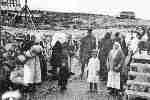
|
Women and children in the Spirit Lake internment camp, Quebec (Photo courtesy of the National Archives of Canada / PA170620) |
Ukrainian Canadians are asking the federal Government to acknowledge officially that Ukrainians were mistreated in Canada during and after the First World War and to negotiate with leaders of the Ukrainian Canadian Committee for redress.
In a brief presented recently to the standing Commons committee on multiculturalism, the committee said Ukrainian Canadians are asking that the Government "publicly acknowledge responsibility for the wrongs done to the Ukrainian-Canadian community between 1914-1920 and compensate them for those losses."
The 17-page brief, which was prepared by Lubomyr Luciuk on behalf of the Ukrainian committee's Civil Liberties Commission, stressed that the "meaningful and honorable redress now called for will help ensure that Canadians are never again subjected to such a mass violation of their human rights and civil liberties.
"Although what happened can never be undone, a time for atonement has surely come."
During his research, Mr. Luciuk discovered that from 1914 to 1920, 8,579 so-called enemy aliens were incarcerated, among them women and children. Of that number 3,138 could be classified as prisoners of war the brief says. The other 5,441 were civilians, and Mr. Luciuk estimates-that nearly 5,000 were of Ukrainian origin.
A further 88,000, most of them Ukrainian,were categorized as enemy aliens and were obliged to report regularly to their local police authorities or the North West Mounted Police, Mr. Luciuk's research shows. They were issued with identity papers that had to be carried at all times, and the penalty for non-compliance was immediate arrest.
A spokesman for Secretary of State David Crombie said yesterday that the minister "is not in a position at this time to say what action the Government will take" on the redress issue.
Gus Mitges, chairman of the Commons committee, said the Ukrainian committee's brief is "under study and hopefully we will have an answer soon."
Mr. Mitges said he was not prepared to comment any further because the committee has not had enough time to study the brief. "We hope to have an interim report presenting our points. I don't know when the report will be done but it will be done. I just can't give you a definite time."
Mr. Luciuk's research found that Ukrainians living in Canada were rounded up if they had come from the Austrian crownlands of Galicia and Bukovnya. While their citizenship could be described as "Austro Hungarian," their nationality was nonetheless Ukrainian.
Under the War Measures Act of 1914, they were categorized as enemy aliens. That same act would later be used against Japanese Canadians in 1941.
The Ukrainians were imprisoned in one of 2 "concentration camps" established across Canada, Mr. Luciuk noted. Most were sent to work sites "in Canada's hinterlands, places like Spirit Lake, Que., Castle Mountain, Alta., and Otter Creek, B.C.
"There, they were obliged not only to construct the internment camps but to work on various projects such as road building, land clearing, swamp drainage and railway construction," the brief says.
Mr. Luciuk also wrote that when each individual was arrested, "whatever valuables they might have were seized. Some of this confiscated money was stolen."
More than $32,000 in cash was left in the Receiver-General's Office at the end of the internment operations.
"What the property, securities and other valuables that were also confiscated might now be worth has yet to be calculated," the brief says. "The human costs of these internment operations are, of course, incalculable."
Mr. Luciuk said that while passive resistance was common, some internees were "more vigorous in protesting against the conditions they found themselves in. There was, for example, a full-scale riot in the Kapuskasing (Ont.) internment camp.
"There were also numerous escape attempts. During several of these, Ukrainian Canadians were killed," the brief says. "Others committed suicide.".
![]() Return to Righting An Injustice Page
Return to Righting An Injustice Page
![]() Return to Internment of Ukrainians in Canada 1914-1920 Page
Return to Internment of Ukrainians in Canada 1914-1920 Page
![]() Return to Ukrainian History Page
Return to Ukrainian History Page
![]() Return to InfoUkes Home Page
Return to InfoUkes Home Page
Document URL: http://www.infoukes.com/history/internment/booklet02/doc-007.html
Copyright © 1994 Ukrainian Canadian Civil Liberties Association
Copyright © 1994 Lubomyr Luciuk
We acknowledge the help in the preparation of this document by Amanda Anderson
Page layout, design, integration, and maintenance by G.W. Kokodyniak and V. Pawlowsky
Copyright © 1996-1997 InfoUkes Inc.
E-mail: internment@infoukes.com
|
since Mar 1 1997 |
InfoUkes Inc. Suite 185, 3044 Bloor Street West Etobicoke, Ontario, Canada M8X 2Y8 Tel: (416) 236-4865 Fax: (416) 766-5704 |
Originally Composed: Saturday September 21st 1996.
Date last modified: Thursday October 30th 1997.